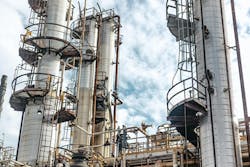Vertex pivoting Mobile refinery hydrocracker back to conventional from renewable service
Vertex Energy Inc. will capitalize on the flexibility of its previously completed renewable diesel hydrocracker conversion project at subsidiary Vertex Refining Alabama LLC’s 75,000-b/d refining and petrochemical complex in Mobile, Ala., by returning the unit to production of conventional fuels by yearend 2024.
“Due to the significant macroeconomic headwinds for renewables over the past 12 months, many of which we believe will continue to occur over the next 18 months and beyond, we have decided to strategically pause our renewable diesel business and pivot to producing conventional fuels from the hydrocracker unit,” Ben Cowart, Vertex’s chairman and chief executive officer, told investors in the company’s first-quarter 2024 earnings call on May 9.
The reconfiguration of the hydrocracker back to conventional service will occur during a previously scheduled catalyst and maintenance turnaround of the unit later this year, during which time the operator will replace renewable catalyst with conventional catalyst and transition the unit back to production of petroleum-based products, Vertex said.
In line with the pause-and-pivot strategy, Vertex is currently running down its existing inventory of renewable feedstocks in preparation for the hydrocracker’s return to conventional processing, which is anticipated for completion sometime in third-quarter 2024, said James Rhame, Vertex’s chief operating officer.
The timeline for the hydrocracker’s complete pivot back to conventional processing and production, however, remains subject to Vertex securing necessary catalyst supply and regulatory permitting to execute the project, Rhame added.
The hydrocracker’s proposed return to conventional diesel service comes only a year following the unit’s start of renewable diesel production following commissioning of Vertex’s multimillion-dollar Phase 1 renewable diesel conversion project (RDCP) to upgrade the Mobile refinery’s existing conventional hydrocracker—which previously produced olefins as feedstock for petrochemical manufacturers—to process a wide range of organic, pretreated feedstocks, including soybean and corn oil, meat tallow, and waste vegetable oils, among others (OGJ Online, May 1, 2023).
Flexible plan
While increasing supplies of renewable diesel from recently completed and upcoming renewable fuels projects prompted the strategic decision, the hydrocracker’s planned return to fossil-based fuel production comes as part of Vertex’s original goal for the RDCP, which was investing to equip the unit with flexibility to switch back and forth between renewable and conventional production based on economics and market demand, Cowart told investors.
“When modeling the [hydrocracker] in conventional service against first-quarter 2024 historical data, we estimate the unit could have significantly improved our [quarterly] results, providing an additional fuel gross margin contribution of roughly $40 million on conventional fuels,” Cowart said.
While Vertex did not specify a timeframe for if or when it might return the hydrocracker to renewable service, Cowart said allowing “for more optionality” in the unit was a necessary step to increase the company’s cash position, reduce its operating costs, and improve margins for the remainder of 2024 and into 2025.
Vertex’s proposed reconfiguration of the hydrocracker—which produced 4,003 b/d of renewable diesel during first-quarter 2024—marks the first formal disclosure by any operator taking on a flexible conventional-to-renewable unit conversion in recent years of its intention to take advantage of the unit’s adaptability to either mode of service.
About the Author
Robert Brelsford
Downstream Editor
Robert Brelsford joined Oil & Gas Journal in October 2013 as downstream technology editor after 8 years as a crude oil price and news reporter on spot crude transactions at the US Gulf Coast, West Coast, Canadian, and Latin American markets. He holds a BA (2000) in English from Rice University and an MS (2003) in education and social policy from Northwestern University.

